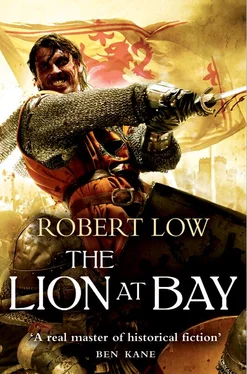Addaf had followed a deal of it, despite their being English, for that tongue was now heard more and more in Wales and it was a sensible man who learned it and spoke it well. Then, he thought, they turn round and speak an even stranger tongue, the French, which wasn’t even their own but belonged to the people they were fighting. Among others.
He had listened quietly, too, for it was also a sensible man who realised that fighting against these folk was now old and done, though the defeat in it was still a raw wound no more than a handful of years gone. Yet taking their money to fight with them was almost as good a revenge for Builth and the loss of Llewellyn and better than starving in the ruin war had made of the valleys.
Yet peasant was too hard for a man of those same valleys to bear.
‘I am Addaf ap Dafydd ap Math y Mab Lloit Irbengam,’ he growled in English, ‘and no peasant with an arse of rags.’
He saw the look on them, the same as the look on folk’s faces when they had seen the two-headed calf at the fair the year he had left. The fat one looked bemused.
‘Do. You. Speak. English?’ this one demanded, leaning forward and talking as if Addaf was a child. The tall one with the long face, the one pointed out as having fought Welsh once, twitched the mourn of his moustaches into a brief smile.
‘You are annoying a Welshman, Treasurer,’ he said, ‘for English is what he is already speaking.’
Addaf saw the fat one bristle like an old boar sow.
‘His name,’ Sir Marmaduke explained, speaking English, both clear and slow, Addaf noted, so that everyone would understand, ‘means Addaf son of David, son of Madog, though the last part confuses me a little – The Brown Lad With The Wrong Head?’
He knew the Welsh – Addaf took to this Sir Marmaduke at once, for he had once been a bold adversary and he knew the Welsh a little and the English as spoken by True People; Addaf heaved a sigh of relief.
‘Dark and stubborn, I am after believing it is in your own tongue,’ he said and added ‘Lord,’ because it did no harm to mark the trail of matters politely.
‘I am from the gwely of Cilybebyll,’ he explained earnestly, so that these folk would know with whom they dealt. ‘I have a cow and enough grazing land to feed eight goats for a year. I am a free man of the True People, by the grace of God, sharing an ox, a goad, a halter and a ploughshare with three others in common. I am not a serf with ragged arse.’
‘Did you understand any of that?’ Cressingham demanded waspishly. Sir Marmaduke turned slowly to him.
‘You have offended him, it appears. In my experience, Cressingham, it does no good to offend a Welshman. Particularly bowmen – see you the shoulder? That hump is pulling muscle, Treasurer. Addaf here has some twenty-odd summers on him and I’ll warrant at least seventeen of them have been used to train with that bow until he can pull the string on one taller than a well-made man and thick as a boy’s wrist, all the way back to his ear. The arrows, I will avow, are an ell at least and are fletched, not with goose, but with peacock, which means they are his finest. This man can put such a shaft through an oak church door at a hundred paces and then another ten or so of its cousins within the minute. If he does his job aright, he will not need iron hat or studded jack or maille – all his enemies will be dead in front of him.’
He broke off and stared fixedly at Cressingham, who did not like the look of him nor of the scowling black-faced Welshman.
‘Christ be praised,’ murmured Brother Jacobus and crossed himself into the twist of Addaf’s smile.
‘For ever and ever,’ they intoned – Addaf louder than the rest, just so the crow of a priest would get the point.
‘I would take our Welshman as is, Treasurer,’ Sir Marmaduke added gently, ‘and be glad of it.’
‘Just so,’ De Warenne added and thumped the table. ‘Now, Treasurer, you can carry on doing what you do best – scribbling and tallying up how to get my army, well fed and in good humour, to where I can meet this Wallace Ogre and defeat him.’
Sir Marmaduke watched Addaf the Welshman slap barefoot back across the flags, dismissed with barely controlled fury by Cressingham, who now closed his head with the Black Friar and his ink-fingered clerk. De Warenne, hugging himself in his cloak, fell back on complaint.
It was bad enough, Sir Marmaduke thought wearily, that the pair of them were in charge of this battue without there being a Wallace at the other end of it.
Blind Tarn’s tavern, near Bothwell
Feast of the Transfiguration of Christ, August 1297
He came down on the road on a tired horse, hood up and cloak swaddling him. The horse was being nagged on and did not like it much, balking now and then, tugging Malise’s arm and stumbling. It was no wise thing to be out on the roads alone at the best of times and certainly not now.
Even so, Malise was half-asleep and daydreaming of himself on one of the Buchan’s great warhorses, or a captured stallion of The Bruce, all fire and rearing, a stiff prick with iron hooves. He was riding down fleeing men and closing in on a woman, who ran screaming, until he got close and found himself, suddenly, off the powerful horse and staring at her. She lay helpless, bosom heaving after the running – but gave him a knowing smile and a look, then put one finger between her impossibly red lips and sucked it. She was Isabel and he had his hands on her thighs …
The sudden clatter startled him and he jerked awake, in time to see a man duck out of a sacking-covered doorway, unlacing his front and cursing as he stumbled over a discarded bucket. He gave Malise the merest bleary glance, then directed a stream of steaming relief on the dungheap, farted noisily and stared with unfocused eyes at the wattle-and-daub wall of what Malise realised was not a stable for the tavern, but the man’s home.
Malise blinked once or twice and forced the tired mount down the length of road where buildings straggled, separated by drunken fencing and strips of bare, turned-earth plots. Ahead lay the great ramshackle arrangement of an inn, two storeys high and timber-framed on stone; the smell of food flooded Malise.
A woman appeared from one of the houses, driving a cow to be staked on a small patch of communal grass. It dropped dung with a splatter and, without breaking stride, she scooped it up in a basket and went on, looking briefly at Malise, who glared back from under his hood until she dropped her eyes.
She might well have been pretty once – her dress had the memory of bright colour in it somewhere – but she was long severed from cleanliness or good manners, with a face roughened by wind and weather, yet pasty and pinched under the windchape. Malise slithered off the horse at the tether pole, hearing movement inside the inn and a burst of laughter; the horse sagged, hipshot and relieved.
The inn was dim inside and the moment of stepping from light to dark left Malise disorientated, so that he panicked and fumbled for the hilt of his dagger. Then the stink hit him – thick air, old food, spilled drink, farts, shit, vomit and, with a thrill that made him grunt, the thin, acrid stink of old sex. The place was also a brothel.
When his eyes adjusted, he was in a large room with a beaten earth floor and roughcast walls laced with timber. There were rushes strewn on the floor between the tables and benches, but it was clear they had not been changed in some time. Two great metal lanterns with horn panels hung on chains from the main rafters, together with tray-pulleys, for hauling drink and food to the gallery that went all round the square of the place. Up there, Malise reckoned, were sleeping rooms and the stair to them was behind the earthen oven and the slab of wood that served as a worktop. It was altogether a fine inn.
Читать дальше












